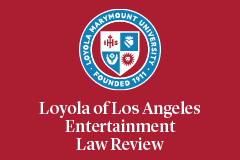Abstract
This Note highlights the growing concern of Internet defamation and the lack of viable legal remedies available to its victims. Internet defamation is internet speech with the purpose to disparage another’s reputation. At common law, a victim of alleged defamation has the right to file suit against not only the original speaker of the defamatory statements, but the person or entity to give that statement further publication as well. In certain cases even the distributor, such as a newspaper stand, can be held liable for a defamation claim. However, liability due to defamatory speech on the Internet is quite different. Due to the anonymity offered by the Internet, a victim of Internet defamation, more often than not, is unable to file suit against the original speaker. As a result, the victim attempts to file suit against the website that published the defamatory statement the original speaker created. However, the victim often finds that such a website is immune from liability under section 230 of the Communications Decency Act of 1996, which provides, “No provider or user of an interactive computer service shall be treated as the publisher or speaker of any information provided by another information content provider.” This sweeping statute can effectually eliminate all viable defendants for a victim of Internet defamation to seek a legal remedy for the harm caused to him or her.
At the time of the Act’s creation, the Internet was in its primal years and was nothing like it is today. The question is then raised, how could the drafters of the Act been able to predict the nature and dominance of the Internet as it exists twenty years later? Today, there are websites dedicated entirely to providing a forum for unsupported and unchecked gossip. Specifically, TheDirty.com even goes so far as to screen every submission from their third-party users in order to select for publication only those most egregious and damaging. Moreover, the website publishes all submissions under the same pseudonym, thus claiming the statements as its own and further protecting the anonymity of the original speaker. Despite the exorbitant amount of editorial control exerted by TheDirty.com, a federal appellate court recently found the website to be immune to defamation claims under section 230.
The Internet is far more reaching than its print counterpart, and defamatory statements are forever archived and accessible via general search engines. With such great exposure and potential for irreparable harm, this Note proposes that section 230 should be amended so as to properly distinguish a passive website entitled to immunity (the type of website the Act’s drafters had confronted and contemplated) and those of a more culpable nature, such as TheDirty.com. Furthermore, Internet defamation should revert back to being treated the same as it would at common law. If a website provides a forum for legally actionable activities, actively exercises editorial control of users’ content, and protects the anonymity of their users, then the website should be held liable for said actions as well.
Recommended Citation
Heather Saint,
Section 230 of the Communications Decency Act: The True Culprit of Internet Defamation,
36 Loy. L.A. Ent. L. Rev. 39
(2015).
Available at: https://digitalcommons.lmu.edu/elr/vol36/iss1/2
Included in
First Amendment Commons, Internet Law Commons, Legal Remedies Commons, Litigation Commons, Privacy Law Commons, Torts Commons


